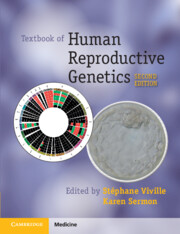Book contents
- Textbook of Human Reproductive Genetics
- Textbook of Human Reproductive Genetics
- Copyright page
- Contents
- Contributors
- Chapter 1 Basic Genetics and Cytogenetics: A Brief Reminder
- Chapter 2 Application of Whole-Genome Technologies to Assisted Reproductive Treatment
- Chapter 3 Meiosis: How to Get a Good Start in Life
- Chapter 4 Chromosomes in Early Human Embryo Development: Incidence of Chromosomal Abnormalities, Underlying Mechanisms, and Consequences for Diagnosis and Development
- Chapter 5 DNA Is Not the Whole Story: Transgenerational Epigenesis and Imprinting
- Chapter 6 Genes Are Not the Whole Story: Retrotransposons as New Determinants of Male Fertility
- Chapter 7 Chromosomal Causes of Infertility
- Chapter 8 Genetics of Human Male Infertility: The Quest for Diagnosis and Treatment
- Chapter 9 Genetics of Human Female Infertility
- Chapter 10 Preconception Genetics Analysis/Screening in IVF
- Chapter 11 Genetic Counseling in Assisted Reproductive Treatment
- Chapter 12 Mitochondrial Genetics in Reproductive Medicine
- Chapter 13 Preimplantation Genetic Testing
- Chapter 14 Epigenetics and Assisted Reproductive Technology
- Chapter 15 Human Reproductive Genetics in Medically Assisted Reproduction: Ethical Considerations
- Index
- References
Chapter 11 - Genetic Counseling in Assisted Reproductive Treatment
Published online by Cambridge University Press: 15 December 2022
- Textbook of Human Reproductive Genetics
- Textbook of Human Reproductive Genetics
- Copyright page
- Contents
- Contributors
- Chapter 1 Basic Genetics and Cytogenetics: A Brief Reminder
- Chapter 2 Application of Whole-Genome Technologies to Assisted Reproductive Treatment
- Chapter 3 Meiosis: How to Get a Good Start in Life
- Chapter 4 Chromosomes in Early Human Embryo Development: Incidence of Chromosomal Abnormalities, Underlying Mechanisms, and Consequences for Diagnosis and Development
- Chapter 5 DNA Is Not the Whole Story: Transgenerational Epigenesis and Imprinting
- Chapter 6 Genes Are Not the Whole Story: Retrotransposons as New Determinants of Male Fertility
- Chapter 7 Chromosomal Causes of Infertility
- Chapter 8 Genetics of Human Male Infertility: The Quest for Diagnosis and Treatment
- Chapter 9 Genetics of Human Female Infertility
- Chapter 10 Preconception Genetics Analysis/Screening in IVF
- Chapter 11 Genetic Counseling in Assisted Reproductive Treatment
- Chapter 12 Mitochondrial Genetics in Reproductive Medicine
- Chapter 13 Preimplantation Genetic Testing
- Chapter 14 Epigenetics and Assisted Reproductive Technology
- Chapter 15 Human Reproductive Genetics in Medically Assisted Reproduction: Ethical Considerations
- Index
- References
Summary
In the past decade the development of new technologies and innovations have revolutionized genetic testing. The ability to diagnose and prevent genetic disorders before an existing pregnancy and to detect embryonic and fetal genetic errors has dramatically increased, and has substantially changed the care for couples wanting a child.
- Type
- Chapter
- Information
- Textbook of Human Reproductive Genetics , pp. 155 - 168Publisher: Cambridge University PressPrint publication year: 2023

